A fine continuation of the first book. The only negative note I have is that I want more!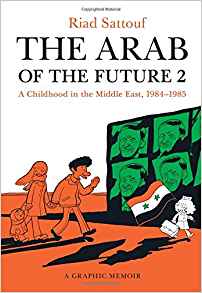
Category: Biography
The Pope of Physics
On the one hand, I enjoyed this book. On the other, for such an important and 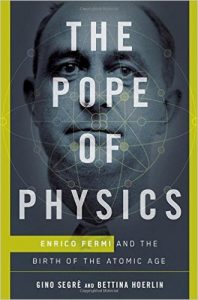 fascinating character as Fermi, I couldn’t help but think this book was a bit of small beer. I would’ve happily enjoyed a book three times its length. Relatedly, I would’ve liked fewer asides about the general aspects of the Manhattan Project. Perhaps there’s no good way to get all the info now, but I would’ve loved to get a stronger feel for all those deathbed conversations with great and controversial thinkers.
fascinating character as Fermi, I couldn’t help but think this book was a bit of small beer. I would’ve happily enjoyed a book three times its length. Relatedly, I would’ve liked fewer asides about the general aspects of the Manhattan Project. Perhaps there’s no good way to get all the info now, but I would’ve loved to get a stronger feel for all those deathbed conversations with great and controversial thinkers.
I don’t want to say it’s a bad book – in fact it might be the best Fermi biography available. It also has the incidental point of interest that one of the authors is the nephew of Emilio Segrè, which may explain why the sections about Fermi’s friends were some of the best and most detailed of the book. If you, like me, enjoy biographies from the Heroic Age of Physics, it’s definitely worth a read.
Vietnamerica
What a great memoir. I’ve been reading a lot of memoirs in graphic novel format lately, and this one was one of the very best, both in terms of its style and execution. I especially enjoyed the way in which the book moved from scene to scene without frequently telling you what year or location it was. The artwork 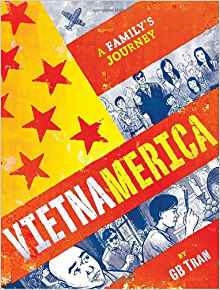 and, well, comicking itself was just so good that I rarely had to take a second to figure out where the scene had changed to.
and, well, comicking itself was just so good that I rarely had to take a second to figure out where the scene had changed to.
The only critique that occurred to me is that the “character” of Tran himself in the story feels very… unformed. Maybe this is simply because it depicts Tran mostly at a younger age, where he would’ve been, indeed, unformed. But, I couldn’t help but feel that the character is so self-flagellating (he is almost always depicted as a sort of know-it-all punk kid) that you miss what could be a more whole interaction between kids and parents. Tran’s past self feels less like a person than a point of embarrassment that the author is covering over with humor. It still works well enough, but I would’ve loved if, here and there, we had a moment of just Tran being himself, in a way that only develops character, rather than moving forward the book’s telling of history.
But, still, quite a good memoir comic, and absolutely beautiful.
Pyongyang
A quick and fun sketch of the author’s time spent working for an animation 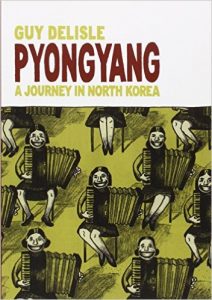 studio in North Korea. I don’t have too much to say about it, other than that it’s quite enjoyable, and that I plan to read other books by the author. This isn’t a memoir like March or Maus – it’s not trying to bring you to a heightened awareness of the universe. It’s not particularly poignant, nor is it trying to be. It’s just an incredible well-told, occasionally quite funny, recounting of a short strange time in the author’s life.
studio in North Korea. I don’t have too much to say about it, other than that it’s quite enjoyable, and that I plan to read other books by the author. This isn’t a memoir like March or Maus – it’s not trying to bring you to a heightened awareness of the universe. It’s not particularly poignant, nor is it trying to be. It’s just an incredible well-told, occasionally quite funny, recounting of a short strange time in the author’s life.
The Complete Maus
Dammit, this book is perfection. I hope I write something this good someday.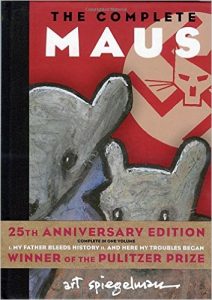
It’s the story of Spiegelman’s father Vladek, and his experiences during the Holocaust. The story is framed by an equally compelling collection of interactions between Spiegelman and his father as the former collects these stories in order to create the comic book. This book is rightfully considered a classic, and I’m glad I finally got around to it. Time to do a Spiegelman dive.
Narconomics
Oh man, I enjoyed the crap out of this book. It’s basically a surprisingly brave business/econ reporter discussing the economics of illegal drugs. Like, for instance, he talks about how we keep fighting the supply side of drugs, which just 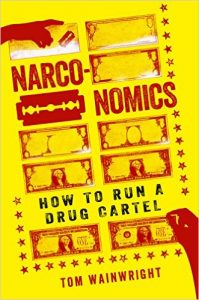 drives up the price. There’s also a really interesting discussion of how law enforcement groups calculate the value of drug busts. In short, they don’t calculate the value to the cartel, but rather the street value. The author notes that this is sort of like calculating the value of a cow by seeing the price of a steak at a Manhattan restaurant.
drives up the price. There’s also a really interesting discussion of how law enforcement groups calculate the value of drug busts. In short, they don’t calculate the value to the cartel, but rather the street value. The author notes that this is sort of like calculating the value of a cow by seeing the price of a steak at a Manhattan restaurant.
Anyway, yeah, really interesting. Wainwright, like just about everyone who looks into this topic deeply, comes out in favor of legalization.
March, books 1, 2, and 3
I actually read all of these over the course of February, but I think I can cover them in one post.
This series is basically the story of civil rights in the US from the perspective of John Lewis. The story is framed by his interactions with President Obama as Obama is inaugurated.
I’m gonna say something a little heretical about these books. Although they’re 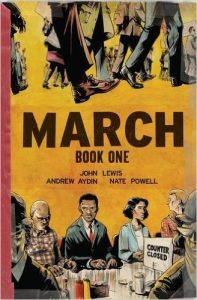 excellent, for me they were somewhat victims of their hype. As a graphic way to tell John Lewis’ version of events, they were quite good, but at times, the story felt mildly disjointed. Some of this is, I presume, because the subject matter is just John Lewis recollecting things. But, I would’ve liked to see it organized in a way that carried the emotional arc more. I know this is asking a lot of a memoir, but compare it to, for example, Maus by Spiegelman. The latter is also a true story, and also a memoir of sorts, but every moment seems to be there for a reason.
excellent, for me they were somewhat victims of their hype. As a graphic way to tell John Lewis’ version of events, they were quite good, but at times, the story felt mildly disjointed. Some of this is, I presume, because the subject matter is just John Lewis recollecting things. But, I would’ve liked to see it organized in a way that carried the emotional arc more. I know this is asking a lot of a memoir, but compare it to, for example, Maus by Spiegelman. The latter is also a true story, and also a memoir of sorts, but every moment seems to be there for a reason.
One way in which the books are similar, yet different, is the use of framing devices. In Maus, it’s the son of the Shoah survivor’s attempt to make sense of himself and his relationship to his parents. I found it very strong, in part because it’s non-obvious – the father and son spend most of their time together fighting. It results in a beautifully nuanced character. The framing device in March is a bit more obvious and sentimental, and it’s not clear to me what it adds artistically.
That said, it’s still a fine series, and a great addition to your graphic novel collection. For me, it was kind of like Persepolis – great stuff, but it was missing that deeper note that the author seemed capable of.
The Complete Persepolis
This is a graphic novel about the author’s life growing up during the Iranian 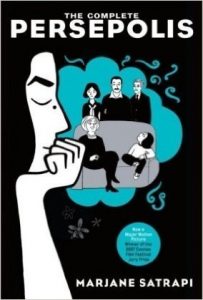 Revolution as the daughter of secular leftist parents. It’s not the most beautiful of graphic novels, but the art hits the right tone. Although I enjoyed it, and recommend it if you’re interested in the history, I have trouble putting it on the same pedestal as books like Fun House by Bechdel. Bechdel’s book both recounts stories from her life and weaves them into a sort of visual poem. Satrapi’s stories are fascinating (viscerally, they are more interesting than Bechdel’s), but they don’t really come together as something.
Revolution as the daughter of secular leftist parents. It’s not the most beautiful of graphic novels, but the art hits the right tone. Although I enjoyed it, and recommend it if you’re interested in the history, I have trouble putting it on the same pedestal as books like Fun House by Bechdel. Bechdel’s book both recounts stories from her life and weaves them into a sort of visual poem. Satrapi’s stories are fascinating (viscerally, they are more interesting than Bechdel’s), but they don’t really come together as something.
They are vignettes from her life, and that of itself is quite enjoyable, but I came away wanting something more. Perhaps it’s just my ignorance, but it wasn’t clear to me why a story or moment went in one place and not another, other than mere chronology.
The Master of Auschwitz
What a weird and fascinating memoir. Basically, while the British held him after 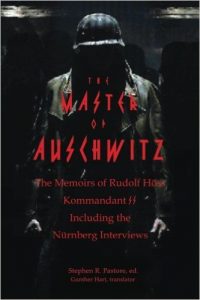 the war, Höss wrote out a memoir, a few short documents, and some letters. They are collected in this book, which through its strangeness becomes a sort of lesson in evil. It is remarkable how utterly banal much of his descriptions of Auschwitz are. Much of his writing dwells on what are basically HR problems, having to do with lazy employees or employees who did a good job but created a bad work environment.
the war, Höss wrote out a memoir, a few short documents, and some letters. They are collected in this book, which through its strangeness becomes a sort of lesson in evil. It is remarkable how utterly banal much of his descriptions of Auschwitz are. Much of his writing dwells on what are basically HR problems, having to do with lazy employees or employees who did a good job but created a bad work environment.
When the methods of mass murder are described, they are done in a remarkably clinical manner, almost as if he’s describing any sort of factory equipment, in terms of its efficiency and effectiveness.
There’s also a sense of incompleteness borne of inconsistency here. At times Höss seems prepared to apologize and admit he lost his way. At other times, he reaffirms his commitment to national socialism, or makes comments about how dangerous Jews are. He also, perhaps most inexplicably, complains about the bad treatment he felt he was receiving as a prisoner.
Definitely worth reading, as it is a sort of window into a particular form of deranged compartmentalization.
The Undoing Project: A Friendship That Changed Our Minds
This book is a telling of the story of Daniel Kahneman and Amos Tversky, as they created prospect theory, and all that came with it. On the one hand, this ground has already been covered in other books (including one by Kahmeman himself!), but on the other hand… it’s Michael Lewis. I dunno. It’s weird. Like finding out there’s yet another book about Einstein, but it was written by Mary Roach.
In any case, it’s definitely a fine book, and it contains a lot of information I was not aware of, including in depth discussion of the intellectual love affair and later falling out between Kahneman and Tversky.
I’d have to say I recommend it if you’re not familiar with the topic. Lewis always writes well, and the subject matter is interesting. But, if you’re in any way up to date on this stuff, a lot of the stories will be familiar to you.
